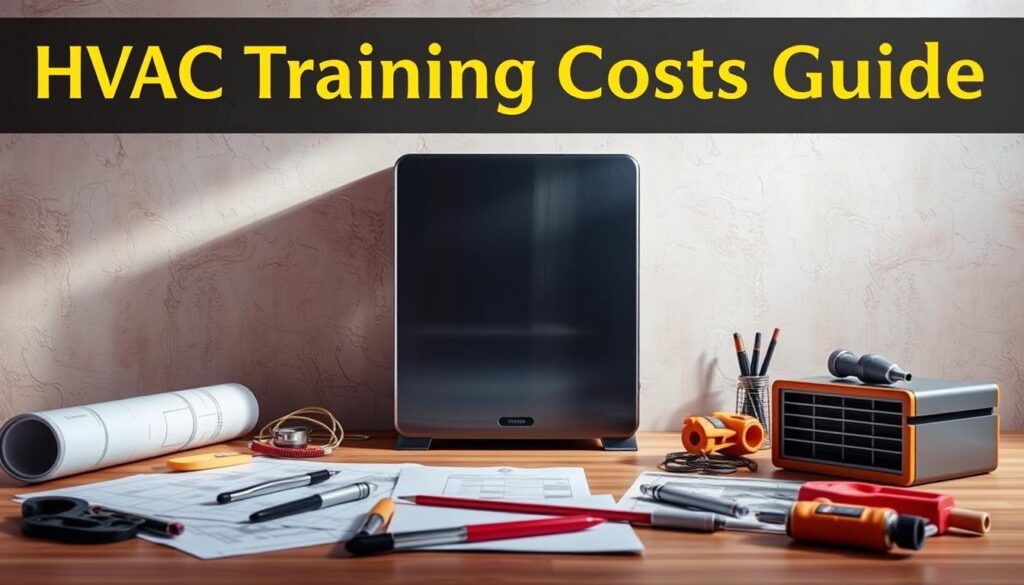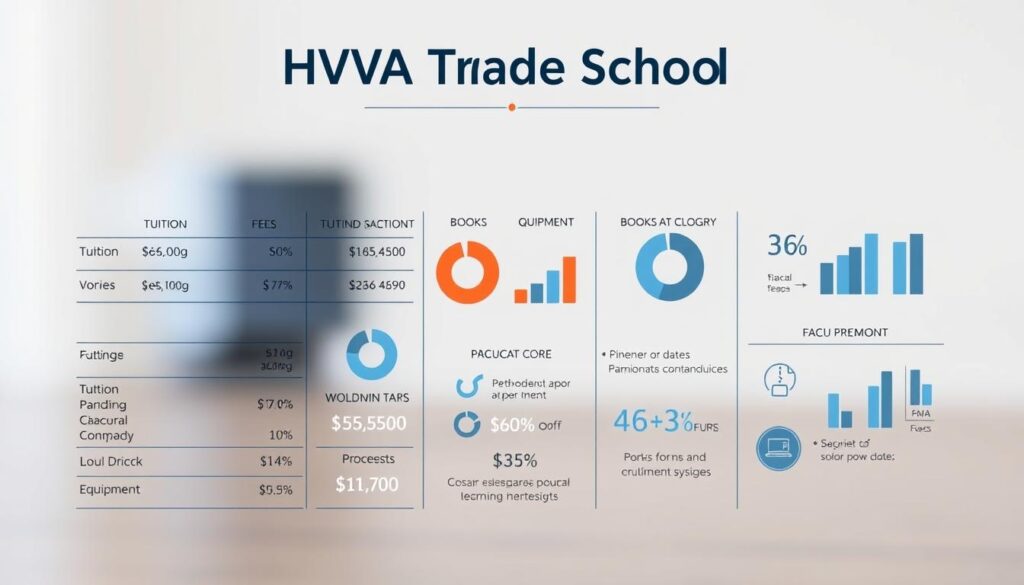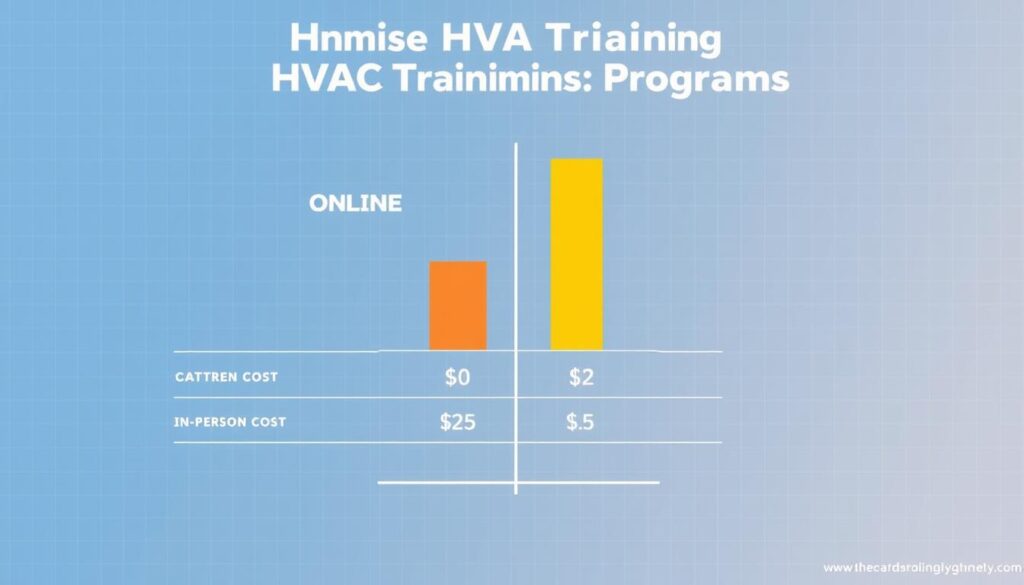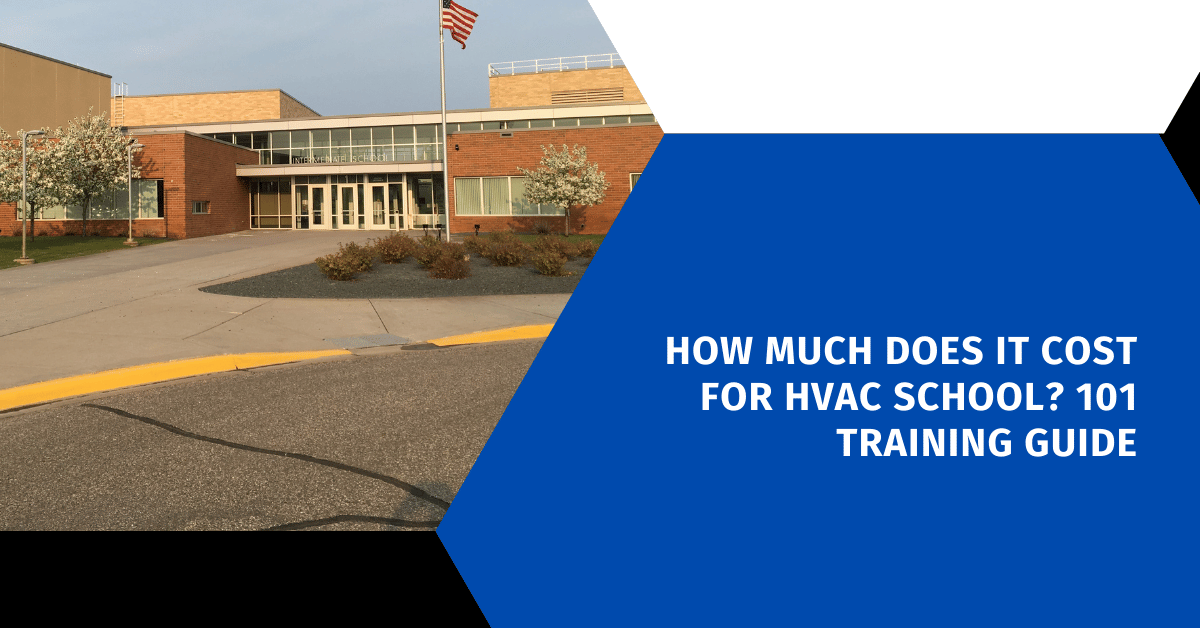Affiliate Disclosure
HVAC Guide Guys is a participant in the Amazon Services LLC Associates Program, an affiliate advertising program designed to provide a means for sites to earn advertising fees by advertising and linking to Amazon.
How Much Does It Cost for HVAC School? Are you thinking about HVAC training as a career move? The heating, ventilation, and air conditioning field is full of opportunities. It’s a dynamic technical area that could change your career path.

Knowing the cost of HVAC school is key if you’re considering this career. The HVAC industry is booming, with a high demand for skilled technicians in the U.S. Your training investment could lead to a stable, rewarding job with many chances for growth.
This guide will cover the financial side of HVAC training. We’ll look at different educational paths, certification costs, and the return on investment. Whether you’re a new high school graduate or looking for a career change, you’ll find all the info on HVAC training costs here.
Key Takeaways
- HVAC training costs vary widely depending on program type
- Multiple financial aid options exist for aspiring technicians
- Certification is essential for career advancement
- Average HVAC program costs range from $1,200 to $15,000
- Career opportunities continue to expand in the HVAC industry
Table of Contents
Understanding HVAC Training and Career Pathways
Exploring hvac certification programs can open doors to exciting career opportunities in the heating, ventilation, and air conditioning industry. Your journey into this dynamic field begins with understanding the educational pathways available to aspiring HVAC technicians.
HVAC technician education expenses vary depending on the type of program you choose. Students have multiple options to gain the necessary skills and credentials for a successful career in this growing field.
Types of HVAC Educational Programs
- Certificate Programs: Short-term training typically lasting 6-12 months
- Associate Degree Programs: Two-year educational tracks
- Apprenticeship Programs: Hands-on training combining classroom learning and practical experience
Career Opportunities After Certification
| Career Path | Typical Responsibilities | Average Entry-Level Salary |
|---|---|---|
| Residential HVAC Technician | Home system installation and repair | $45,000 – $55,000 |
| Commercial HVAC Specialist | Large building system maintenance | $50,000 – $65,000 |
| Energy Efficiency Consultant | System optimization and energy audits | $55,000 – $70,000 |
Industry Requirements and Regulations
Navigating the HVAC industry requires more than just technical skills. You’ll need to meet specific certification requirements, including the critical EPA 608 certification for handling refrigerants. This mandatory credential ensures technicians understand environmental regulations and safe handling of cooling substances.
Professional tip: Stay current with industry certifications to maximize your career in HVAC.
Investing in your HVAC education opens up a world of opportunities in a stable and growing industry. Whether you choose a certificate program or pursue an associate degree, your commitment to learning will be the key to a successful career.
Explore Our HVAC Shop
Looking for top-rated HVAC tools, parts, and accessories? Visit our shop and find the perfect solution for your needs.
Visit the ShopHow Much Does It Cost for HVAC School: Complete Breakdown
Understanding the cost of HVAC school is key for future technicians. The tuition varies based on several factors. It’s important to plan your budget well to handle these costs.
HVAC trade school tuition can range from $1,200 to $15,000. This depends on the program and school. Community colleges are often cheaper, while private schools might cost more.
- Community College Programs: $1,200 – $4,500
- Technical School Programs: $5,000 – $15,000
- Online HVAC Certification: $1,000 – $3,000
Your total cost will depend on a few important things:
| Cost Factor | Price Range | Impact on Tuition |
|---|---|---|
| Program Duration | 6-24 months | Longer programs cost more |
| Location | Regional variations | Urban areas typically higher |
| Certification Level | Entry to Advanced | Advanced certifications increase cost |
When figuring out HVAC school costs, remember to add extra expenses. These include tools, textbooks, and exam fees. These can add $500-$1,500 to your total cost.
Pro tip: Research financial aid, scholarships, and employer tuition reimbursement to offset your HVAC trade school tuition costs.
HVAC Certification Program Options and Duration
Choosing the right HVAC certification program is key to your career. The heating, ventilation, and air conditioning field has many paths to success. Your goals, time, and money will help pick the best program.
- Certificate Programs
- Associate Degree Programs
- Apprenticeship Programs
Certificate Programs: Quick Professional Launch
Certificate programs are the quickest way into HVAC. They last from 6 to 12 months. You’ll learn practical skills and technical knowledge fast.
Associate Degree Programs: More in-Depth Knowledge
An associate degree gives you a deeper HVAC understanding. These two-year programs cover advanced topics, electrical systems, and refrigeration. You’ll have better career chances.
Apprenticeship Programs: Learn and Earn
Apprenticeships mix classroom learning with on-the-job training. They cost differently, but you earn while you learn. They last 3-5 years, sponsored by trade unions and organizations.
Pro Tip: Research local trade schools and community colleges to find HVAC certification programs that best match your career aspirations.
Each program has its own benefits. Your choice depends on your learning style, goals, and budget. Think about program length, cost, and job chances when deciding.
Explore Our HVAC Shop
Looking for top-rated HVAC tools, parts, and accessories? Visit our shop and find the perfect solution for your needs.
Visit the ShopTuition and Fee Structures at Trade Schools

Understanding hvac trade school tuition can be complex. Different vocational training programs have unique fee structures. This impacts your total education investment. Your total cost will depend on several key factors.
Typical hvac vocational training fees break down into multiple components:
- Base tuition cost
- Technology fees
- Lab and equipment usage charges
- Registration expenses
Most HVAC training programs offer two primary pricing models:
- Per-credit pricing: You pay for each credit hour completed
- Flat-rate tuition: A single fixed price for the entire program
Your total hvac trade school tuition can range from $3,000 to $15,000. This depends on the program’s length and institution. Community colleges usually offer more affordable options than private technical schools.
When comparing hvac vocational training fees, consider these critical factors:
- Program duration
- Included equipment costs
- Certification preparation
- Potential financial aid opportunities
Research multiple schools and request detailed fee breakdowns. This will help you make an informed decision about your HVAC education investment.
Additional Expenses Beyond Tuition
When planning your HVAC technician education, remember to budget for more than tuition. Many overlook the big costs of professional training and certification.
Your investment in HVAC professional development includes many costs beyond classroom fees. Knowing these costs early helps you financially prepare and avoid surprises.
Essential Tools and Equipment
HVAC training needs special tools that can affect your budget. Here are some common costs:
- Multimeter: $50-$200
- Refrigeration manifold gauge set: $100-$300
- Vacuum pump: $150-$400
- Tubing cutter: $30-$100
Textbooks and Study Materials
Investing in study materials is key. Textbooks and guides cost $100 to $500, depending on your program and certification.
Certification Exam Fees
Certifications are vital for HVAC techs. The EPA 608 exam costs $50-$150. You might also need to pay for prep courses.
Anticipating these costs helps you budget better. This way, you’re ready for success in the HVAC field.
Explore Our HVAC Shop
Looking for top-rated HVAC tools, parts, and accessories? Visit our shop and find the perfect solution for your needs.
Visit the ShopFinancial Aid and Funding Options
Starting an HVAC career needs smart financial planning. The cost of your hvac training can be lower with the right funding. There are many ways to get financial help for your hvac education.
Both federal and state governments have programs to support trade school students:
- Pell Grants for low-income students
- Federal Student Aid (FAFSA) programs
- State-specific vocational education grants
Scholarships are another big help for those wanting to be HVAC pros. Many groups give out scholarships for students in technical fields:
- HVAC industry association scholarships
- Trade school-specific financial awards
- Minority and underrepresented group scholarships
Student loans can also help cover costs, with good rates for technical education. Some employers even pay for your training, saving you money.
“Investing in your HVAC education is investing in a stable, high-demand career path.” – Career Technical Education Advisor
| Funding Source | Average Coverage | Application Difficulty |
|---|---|---|
| Pell Grants | $6,495 annually | Low |
| Industry Scholarships | $1,000-$5,000 | Medium |
| Employer Tuition Support | Up to $5,250 tax-free | High |
Start researching and applying early to get the most funding. This way, you can lower your hvac education costs.
EPA 608 Certification Requirements and Costs
Getting hvac certification programs is key for HVAC pros wanting to grow in their field. The EPA 608 Certification is a must for those working with refrigeration and air conditioning. It shows you know how to handle refrigerants safely and legally.
This certification proves your skill in refrigerant handling. The Environmental Protection Agency (EPA) makes it a rule for all technicians. It’s a big part of your career growth in HVAC.
Certification Types
- Type I: Small Appliances
- Type II: High-Pressure Appliances
- Type III: Low-Pressure Appliances
- Universal: Covers All Types
Exam Preparation Resources
Getting ready for the EPA 608 exam takes hard work and good study tools. Many schools and training centers offer study guides and practice tests to help you pass.
| Preparation Resource | Cost Range | Study Format |
|---|---|---|
| Online Practice Exams | $20 – $50 | Digital Practice Tests |
| Comprehensive Study Guides | $40 – $100 | Printed Materials |
| Instructor-Led Workshops | $150 – $300 | Live Training Sessions |
Testing Center Locations
You can find EPA 608 testing centers through places like ESCO Institute and NATE. Also, local colleges and tech schools often host exams.
Investing in your EPA 608 Certification is vital for a strong HVAC career. Study well, pick the best study tools, and show your dedication to the field.
Explore Our HVAC Shop
Looking for top-rated HVAC tools, parts, and accessories? Visit our shop and find the perfect solution for your needs.
Visit the ShopComparing Online vs. In-Person HVAC Training Costs

Students looking into HVAC training face a big choice: online or in-person classes. Each has its own benefits and costs for those wanting to work in HVAC.
Online HVAC training often saves money. You can save on:
- Lower commuting expenses
- Flexible scheduling for working students
- Reduced facility usage fees
- Potential digital learning resource discounts
In-person training has its own perks, even if it costs more:
- Direct hands-on equipment experience
- Immediate instructor interactions
- Structured learning environment
- Networking opportunities with peers
| Training Type | Average Cost | Learning Style |
|---|---|---|
| Online HVAC Program | $3,000 – $6,000 | Self-paced, digital |
| In-Person HVAC Program | $5,000 – $15,000 | Structured, hands-on |
Your choice should match your learning style, budget, and career dreams. Think carefully about both options to get the most from your HVAC training.
Return on Investment for HVAC Education
Investing in HVAC technician education is a smart move. It can lead to stable jobs and good pay in many fields. This makes your investment in HVAC training worthwhile.
HVAC technicians start with salaries between $35,000 and $45,000 a year. With more experience and certifications, they can make up to $75,000. This shows that your education costs are a smart choice for a job that’s not easily affected by economic downturns.
- Entry-level technician salary: $35,000 – $45,000
- Experienced technician salary: $55,000 – $75,000
- Projected job growth: 13% through 2028
There are chances to grow in your career. You can specialize in commercial HVAC, refrigeration, or green technology. These areas can boost your salary and make you more sought after.
Skilled HVAC technicians are always in demand in homes, businesses, and factories.
Your education will likely pay off in 2-3 years of steady work. Keeping up with new skills and getting more certifications can also increase your value and earnings.
| Career Stage | Average Annual Earnings | Education Investment Recovery |
|---|---|---|
| Entry Level | $35,000 – $45,000 | 1-2 Years |
| Mid-Career | $55,000 – $65,000 | 2-3 Years |
| Experienced Specialist | $70,000 – $85,000 | 3-4 Years |
By planning well and always improving your skills, you can make the most of your HVAC training. This turns your initial costs into a profitable career path in the long run.
Explore Our HVAC Shop
Looking for top-rated HVAC tools, parts, and accessories? Visit our shop and find the perfect solution for your needs.
Visit the ShopProfessional Development and Continuing Education
Staying ahead in the HVAC field means always learning and improving. Investing in your hvac professional development can greatly boost your career and pay. New tech and changing rules make it key to keep learning.
There are many ways to grow in HVAC certification programs. Technicians can learn new things through advanced training. This keeps them up-to-date with the latest in the field.
Advanced Certifications to Boost Your Career
- NATE (North American Technician Excellence) Certifications
- EPA 608 Advanced Refrigerant Handling Certifications
- Energy Efficiency Specialist Credentials
- Smart Home Integration Certifications
Specialized Training Programs
New tech is changing HVAC. Green energy and smart homes are big chances for those who keep learning.
| Certification Type | Average Cost | Career Impact |
|---|---|---|
| NATE Professional Certification | $200-$500 | 15-25% Salary Increase |
| Green Technology Specialization | $300-$800 | Access to Emerging Markets |
| Smart Home HVAC Integration | $250-$600 | Competitive Edge in Technology |
“Continuous learning is the minimum requirement for success in any field.” – Brian Tracy
Investing in your hvac professional development is more than just new skills. It’s about being seen as a valuable, flexible worker in a fast-changing world. The right certifications and training can lead to better jobs and special roles.
Conclusion
Starting an HVAC career is a smart move with lots of promise. Knowing the cost of HVAC school is key to making a good choice. The cost includes more than just tuition. It also covers training, certification, and keeping your skills sharp.
The cost of HVAC training changes based on the program, where you are, and your learning path. You can choose from trade schools, community colleges, or apprenticeships. These options fit different budgets and learning styles. Even though starting out might cost a lot, the HVAC field offers good pay and job security in the long run.
Doing your homework and planning are essential to get the most out of your education. Look into financial aid, compare costs, and think about your career goals. The HVAC industry is booming, with a big need for skilled workers in homes, businesses, and factories. By picking the right program and keeping up with your skills, you can have a fulfilling and stable career.
Success in HVAC isn’t just about the initial training. It’s about ongoing learning and improving your skills. See your education as an investment in your future and yourself.
FAQ
How much does HVAC school typically cost?
How much does HVAC school typically cost?
FAQ
How much does HVAC school typically cost?
HVAC school costs vary. Certificate programs cost
FAQ
How much does HVAC school typically cost?
HVAC school costs vary. Certificate programs cost $1,200 to $15,000. Associate degrees are $10,000 to $30,000. Trade schools are $15,000 to $25,000. Location, program length, and school type affect the cost.
Are there financial aid options available for HVAC training?
Yes, there are many financial aid options. You can get federal and state grants, trade school scholarships, student loans, and employer training. Many schools offer financial help to make HVAC education more affordable.
How long does it take to complete HVAC training?
HVAC training times vary. Certificate programs last 6-12 months. Associate degrees take about 2 years. Apprenticeships are 3-5 years. It depends on the program and if you study full-time or part-time.
What additional expenses should I budget for beyond tuition?
You’ll need to budget for tools and equipment ($500-$2,000). Also, textbooks and study materials ($100-$500), and certification exam fees ($20-$150). Don’t forget transportation or technology fees.
Is online HVAC training less expensive than in-person training?
Online training can save money on commuting. But, hands-on training is key. Many programs offer a mix of online and in-person learning. This can be more affordable and thorough.
What certifications do I need to become an HVAC technician?
You need the EPA 608 certification for refrigerants. There are four EPA certifications. NATE certifications also show advanced skills and improve job chances.
What is the typical return on investment for HVAC education?
HVAC technicians earn about $50,590 a year, with some making over $80,000. Job growth is 5% from 2020 to 2030. Most students pay back their education in 2-3 years.
Can I work while completing my HVAC training?
Many programs offer flexible schedules. You can find evening, weekend, and online classes. Apprenticeships combine work and classroom learning, allowing you to earn while you learn.
Are there specialized training opportunities in HVAC?
Yes, you can get training in green energy, smart homes, commercial systems, and advanced refrigeration. These specializations can boost your career and earnings.
What is the most cost-effective way to pursue HVAC training?
Community college programs are often the cheapest. Look into apprenticeships for paid education. Apply for scholarships and financial aid. Employer tuition reimbursement can also help reduce costs.
,200 to ,000. Associate degrees are ,000 to ,000. Trade schools are ,000 to ,000. Location, program length, and school type affect the cost.
Are there financial aid options available for HVAC training?
Yes, there are many financial aid options. You can get federal and state grants, trade school scholarships, student loans, and employer training. Many schools offer financial help to make HVAC education more affordable.
How long does it take to complete HVAC training?
HVAC training times vary. Certificate programs last 6-12 months. Associate degrees take about 2 years. Apprenticeships are 3-5 years. It depends on the program and if you study full-time or part-time.
What additional expenses should I budget for beyond tuition?
You’ll need to budget for tools and equipment (0-,000). Also, textbooks and study materials (0-0), and certification exam fees (-0). Don’t forget transportation or technology fees.
Is online HVAC training less expensive than in-person training?
Online training can save money on commuting. But, hands-on training is key. Many programs offer a mix of online and in-person learning. This can be more affordable and thorough.
What certifications do I need to become an HVAC technician?
You need the EPA 608 certification for refrigerants. There are four EPA certifications. NATE certifications also show advanced skills and improve job chances.
What is the typical return on investment for HVAC education?
HVAC technicians earn about ,590 a year, with some making over ,000. Job growth is 5% from 2020 to 2030. Most students pay back their education in 2-3 years.
Can I work while completing my HVAC training?
Many programs offer flexible schedules. You can find evening, weekend, and online classes. Apprenticeships combine work and classroom learning, allowing you to earn while you learn.
Are there specialized training opportunities in HVAC?
Yes, you can get training in green energy, smart homes, commercial systems, and advanced refrigeration. These specializations can boost your career and earnings.
What is the most cost-effective way to pursue HVAC training?
Community college programs are often the cheapest. Look into apprenticeships for paid education. Apply for scholarships and financial aid. Employer tuition reimbursement can also help reduce costs.

